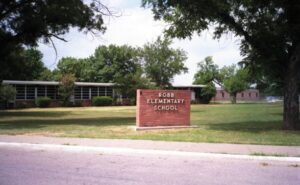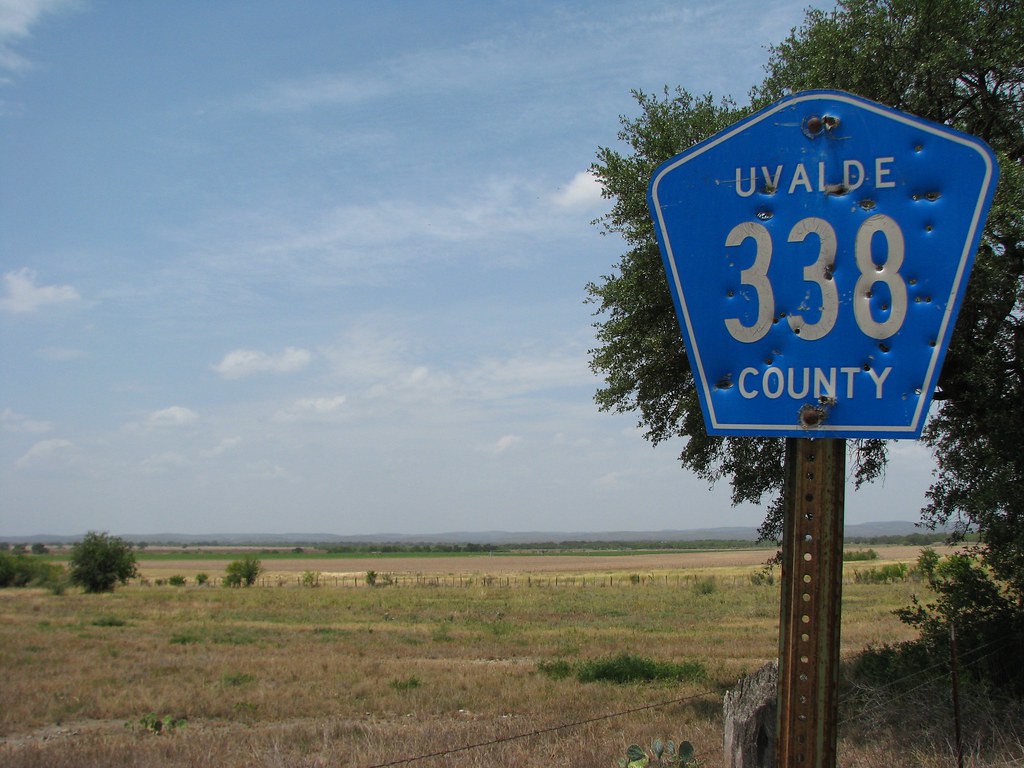(EUGENE, Ore.)—One of the worst scenarios a broadcast journalist faces in conveying a horrific tragedy like the Uvalde, Texas massacre is getting unfamiliar names wrong on-air. In addition to the carnage and grief, mispronouncing the name of a victim or place can strike audiences as egregious.
The shooting deaths of 19 school children and two teachers at the town’s Robb Elementary School posed such a challenge. Right away, my colleagues in the newsroom were split. Was the Texas town pronounced “YOO-vahl-dee,” or perhaps, “ew-VAL-day,” or other ways that were heard in harried reports from NPR and other networks?

Outside Robb Elementary in Uvalde, Texas [Credit: Courtesy of Dan Holloway, Wikimedia common license]
Apparently, we weren’t the only ones grappling with the issue. Differences in how a place name is spoken and why that diversity exists was insightfully addressed in an NPR article by Weekend Edition producer Isabella Gomez Sarmiento a week and a half after the incident.
“Because Uvalde is a town made up of mostly Latino or Hispanic residents…landing on a “correct” pronunciation is tricky — the language of the people who live there exists on a sliding spectrum between Spanish and English, and often consists of a combination of the two,” Sarmiento wrote in her article, “How we pronounce ‘Uvalde says a lot about the power of language in mixed communities.”
“But how we say Uvalde matters, because it represents a long lineage of how Latinos have been racialized in the U.S. and in South Texas, specifically,” she added.
The article says that Uvalde was first named Encina, for the oak trees that grow in the region. But it was later renamed for Mexican governor Juan de Ugalde. The misspelling of “Ugalde” has only complicated the pronunciation debate. Many Spanish-origin words have been recast in “America speak” through the centuries, a phenomenon not limited to Texas. Furthermore, anglicized English was imposed strongly upon Mexican-Americans living in Texas, with many schools banning Spanish altogether. (A similar occurrence happened in U.S. government-run boarding schools for Native Americans for roughly a century, with many Indigenous surnames and place names being replaced by dominant Anglo-American ones.)
This history lives on in many places where colonization and annexation occurred posing a challenge to journalists intent on authenticity and accuracy. But as one source in Sarmiento’s article concedes, “Maybe there isn’t one correct way to say the name of the town…that’s okay. Maybe the most honest and authentic way to represent a community’s past and present is to make room for the messiness.”
“Language is alive — it’s not fixed. Academies of language and purists will try to fix it and correct it, but people are living, language changes over time, and it’s part of that change that keeps things vibrant and interesting.”
A popular Gershwin song lyric goes, “You say tomato [tuh-MAY-toe], I say tomato [toe-MAH-toh].” This, at the time, signified class differences among Americans in the 1930s. It also reflects contrasting layers of culture, education, and identity. And while this all may not resolve an editor’s dilemma of how to settle on a pure and accurate pronunciation, it does highlight the ongoing evolution of language in our world, and how different people appreciate it as it applies to their own identity.
I invite everyone to read Sarmiento’s thoughtful article on Uvalde and its fascinating namesakes, and to approach future coverage with that diversity in mind. Related, Indigenous place names were once dominant for centuries prior to colonization across the Americas. A curious reporter could learn a lot by simply learning what those original place names were, and ask tribal historians about their meanings and how the original inhabitants spoke them.


